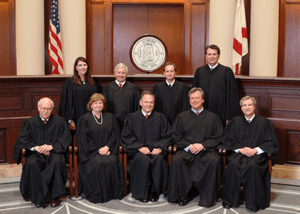 In an opinion issued Tuesday night, the Alabama State Supreme Court upheld the state's ban on same-sex marriage and in so doing contravened a ruling from a U.S. district court judge who down the marriage ban.
In an opinion issued Tuesday night, the Alabama State Supreme Court upheld the state's ban on same-sex marriage and in so doing contravened a ruling from a U.S. district court judge who down the marriage ban.
The court was unconvinced by and unconcerned with the streak of rulings (nearly 60 to date) from both federal and state courts which have found bans on same-sex marriage to be unconstitutional, arguing, “state courts may interpret the United States Constitution independently from, and even contrary to, federal courts." The court stated it would not heed any order from any federal court contradicting its own save for the U.S. Supreme Court.
Remarkably, Alabama Supreme Court Chief Justice Roy Moore recused himself from the case.
The Alabama justices were defiant. “As it has done for approximately two centuries,” the court said, “Alabama law allows for ‘marriage' between only one man and one woman.” Alabama judges have a duty “not to issue any marriage license contrary to this law. Nothing in the United States Constitution alters or overrides this duty.”
The resistance in Alabama, where states' rights has always been sacred writ and state supreme court justices are elected rather than appointed, has been compared by many to that state's resistance to school desegregation orders in the 1963, when Gov. George Wallace (D) stood in the doorway of the University of Alabama to prevent the court-ordered enrollment of black students.
Indeed, the court entrenched itself in its "choice" to uphold a "traditional" definition of marriage:
[The court] accused other courts of employing “sleight of hand” to confer “fundamental-rights status on a concept of marriage divorced from its traditional understanding.”
“Throughout the entirety of its history, Alabama has chosen the traditional definition of marriage,” the court said in a per curiam opinion, issued in the name of the court rather than a specific justice. “… That fact does not change simply because the new definition of marriage has gained ascendancy in certain quarters of the country, even if one of those quarters is the federal judiciary.”
“Marriage has always been between members of the opposite sex,” it said. “The obvious reason for this immutable characteristic is nature. Men and women complement each other biologically and socially. Perhaps even more obvious, the sexual union between men and women (often) produces children. … In short, government has an obvious interest in offspring and the consequences that flow from the creation.”
The Human Rights Campaign (HRC) called the ruling bizarre, rambling and outrageous."The Alabama state Supreme Court does not have the authority to interfere with a federal court order," said HRC Legal Director Sarah Warbelow. "This order is outrageous and baffling, and no amount of legalese can hide the bare animus that forms the foundation of this extralegal ruling."
The case is likely to be appealed to the federal courts. Meanwhile, the U.S. Supreme Court is still slated to hear arguments this spring on challenges to same-sex marriage bans in Kentucky, Michigan, Ohio and Tennessee.
Read the ruling, AFTER THE JUMP…



